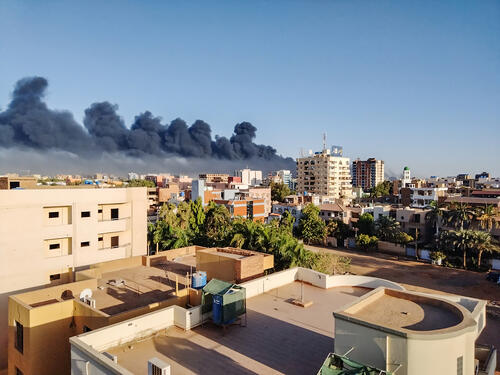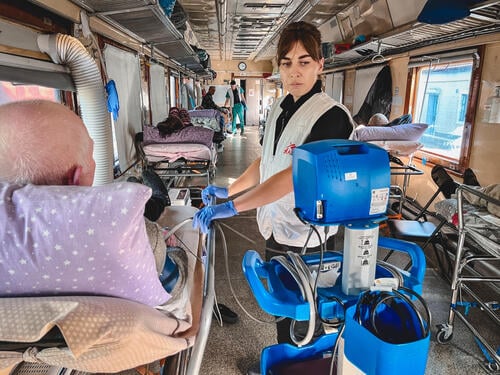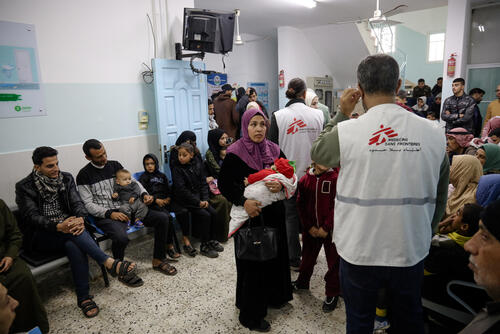In recent years, there has been an increase in the number of wars and the use of extreme violence across the globe.
However, each new war brings different challenges; although the expectation may be that we will always respond in the same way – launching major operations, performing surgery for war-wounded patients, and offering humanitarian assistance to displaced people in remote locations where other aid providers do not go – the reality is that we must adapt our activities to each particular context.
Three recent wars illustrate the types of problems that our teams can face, determining the extent and nature of our operations.
The first problem is access: when the authorities simply do not want us to work in a country, or a certain part of it, and do not give us the necessary permissions to launch an effective response. This can occur when authorities do not want healthcare to be provided to fighters of a group that opposes them, or to the people who live under the control of that group. They may also deny access if they do not want outsiders to witness what is happening in a particular area, or if they do not want a foreign organisation working in the healthcare sector.
Access has been a significant issue for MSF in Sudan. Since the war broke out in April 2023, we have not been given the visas and other authorisations necessary to respond effectively to the immense needs, particularly in Khartoum state. This meant that we were forced, in October 2023, to temporarily suspend surgical activities in one of the hospitals we support in the capital, where healthcare was already grossly inadequate in a city that is home to around three million inhabitants and that is still a very active combat zone. Due to the military blockage of trauma care, our teams have been restricted to working in only a few of the locations where we know people are in dire need of assistance, with a fraction of the capacity.

The second problem is security: when we are unable to guarantee the safety of our teams. This can happen in areas where fighting is too intense and there is no safe space to work in; or if one or more of the parties to a conflict decide to target us, either by attacking our teams or hospitals, or by kidnapping our colleagues.
The security conditions in Gaza since the war started on 7 October 2023 are some of the most extreme that MSF has ever had to work in. Nowhere is safe from Israeli bombardments, not even hospitals. The majority have been damaged or destroyed and have ceased to function. Our staff and their family members have been killed at home, on their way to work, in hospitals, and in shelters. Working amid such violence is practically impossible, and although MSF continues to provide vital healthcare, the scale of the needs in such a brutal war is well beyond our response capacity.
The third problem is perhaps less obvious: our relevance. We mostly see our role as filling gaps in healthcare. Sometimes the national health system – or the international aid system – can cover the majority of needs in certain contexts, even in all-out wars. Therefore, although the situation might seem as if it would benefit from MSF’s expertise, sometimes we struggle to determine what kind of activity could provide an added value. Alternatively, it might be that we are unable to do what we initially envisaged and opt not to engage in other ways. The question then becomes: do we need to insist on working in all conflict zones, even at the price of doing more elsewhere?

Ukraine is an interesting example of this situation. Although the war has caused high numbers of casualties and repeated waves of displacement, the national health system has largely been able to keep functioning. In addition, a huge international aid response has meant that the vast majority of the needs have been met. As a result, our teams have had to innovate, running projects such as a hospital train, and bring to bear our specialist knowledge in areas such as physiotherapy. Despite these successes, however, we have closed some projects in Ukraine to divert resources to other places in the world, where we think the needs are more pressing.
Of course, these problems do not occur in isolation. In Ukraine, for example, our issues with relevance are linked to access: the fact that the authorities prefer to take the lead in treating the military’s wounded means that we don't usually provide direct, lifesaving support in hospitals. And the high level of risk on the frontline, where hospitals frequently come under attack, means that we have less appetite for running non-lifesaving projects. We do not judge the risks to staff to be worth the benefit that the project would bring.
These problems all intersect to mark the limits of what it is possible for MSF to do in war settings. The space that MSF and others manage to negotiate with warring parties is sometimes called ‘humanitarian space’. This is not necessarily a physical space on a map, although that does influence where we can work. Humanitarian space is the room for manoeuvre that we are left with once political and military restrictions, security problems, and the capacity of the existing healthcare system are taken into account. It is within this space that we decide how best we can use our skills – and our donors’ money – to help those caught up in wars around the world today.



